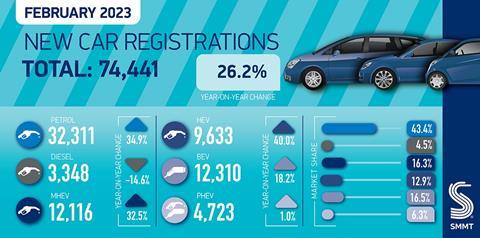- Britain’s new car market rises 26.2% in February, in seventh consecutive month of growth.
- Battery electric deliveries rise 18.2%, with all plug-in cars taking almost a quarter market share.
- Plug-in uptake set to near half a million units in 2023, but Spring Budget measures needed to ensure a fair net zero transition for UK motorists.

UK new car registrations grew by 26.2% in February as 74,441 new cars joined Britain’s roads, according to the latest figures from the Society of Motor Manufacturers and Traders (SMMT).
While February is typically low volume ahead of the March plate change, this year it marked the seventh month of consecutive growth as easing supply chain shortages steered the market closer to pre-pandemic levels, down just -6.5% on the same month in 2020.
The SMMT reported that February saw almost universal growth across the market, with deliveries to private buyers up 5.8% and those to large fleets up 46.2%. Business registrations, which account for a fraction of the market, increased by 0.7%, equivalent to just nine units.
There was also growth in all but two segments, with only registrations of executive and luxury saloon cars falling, by -15.4% and -6.3% respectively. Minis (up 66.1%), multipurpose vehicles (41.9%) and superminis (37.7%) posted the largest percentage uplifts, with superminis remaining the most popular, accounting for a third (33.1%) of all deliveries.
Hybrid electric vehicles (HEVs) recorded the most significant growth of all fuel types, up 40.0%, followed by petrol, up 35.8% with a 56.9% market share, while diesel registrations fell by -7.0%. Battery-electric vehicles, meanwhile, experienced what the National Franchised Dealers Association (NFDA) described as ‘moderate growth’ - up 18.2% to account for one in six new UK car registrations, with plug-in hybrids (PHEVs) rising just 1.0%.
Combined, plug-ins accounted for almost a quarter (22.8%) of all deliveries in the month, with further growth anticipated. The SMMT expects nearly half a million (488,000) PHEVs and BEVs to join Britain’s roads in 2023, as manufacturers bring more than 40 new plug-in electric models to the market.
The SMMT says this will inevitably increase demand for charging infrastructure, however, and while the new £56 million LEVI capability funding is welcome, there remains a clear requirement for binding targets that ensure chargepoint rollout keeps pace.
As the new UK car market looks towards a year of double-digit growth, the Spring Budget is an important opportunity to shape Britain’s net zero progress and deliver an equitable transition for all, states the SMMT. This should include a long-term plan for chargepoint investment, aligning VAT on public charging with domestic energy use, and reviewing the Vehicle Excise Duty premium that will unfairly penalise EV buyers switching to this inevitably more expensive technology in the future.
Mike Hawes, SMMT chief executive, said: “After seven months of growth, it is no surprise that the UK automotive sector is facing the future with growing confidence. It is vital, however, that government takes every opportunity to back the market, which plays a significant role in Britain’s economy and net zero ambition. As we move into ‘new plate month’ in March, with more of the latest high-tech cars available, the upcoming Budget must deliver measures that drive this transition, increasing affordability and ease of charging for all.”
Jon Lawes, managing director, Novuna Vehicle Solutions: “While electric vehicle registrations continue to rise at a steady rate, the UK risks falling behind other leading European countries in the transition to EVs and green transportation.
“Failure to intervene to adequately support the industry, notably to build a more robust supply of battery technology has stymied the UK’s progress to date.
“With the budget fast approaching, it is clear that the Government needs to significantly pledge to ramp up investment in the UK automotive supply chain to meet industry demand or risk compromising its 2030 targets.”
Sue Robinson, NFDA chief executive, which represents franchised car and commercial vehicle retailers in the UK, said: ”New car sales have continued their positive start to the year and we expect steady improvement in both new and used vehicles throughout the year.
“Steady macro-economic conditions should allow the new vehicle market to deliver a solid year. Franchised dealers continue to assist customers with choosing the right vehicle for their needs, finding appropriate financing schemes and the service plan.”
Jon Lawes, managing director, Novuna Vehicle Solutions: “While electric vehicle registrations continue to rise at a steady rate, the UK risks falling behind other leading European countries in the transition to EVs and green transportation.
“Failure to intervene to adequately support the industry, notably to build a more robust supply of battery technology has stymied the UK’s progress to date.
“With the budget fast approaching, it is clear that the Government needs to significantly pledge to ramp up investment in the UK automotive supply chain to meet industry demand or risk compromising its 2030 targets.”

































No comments yet